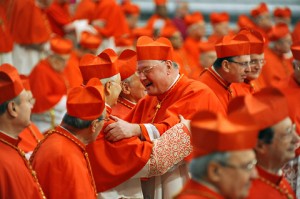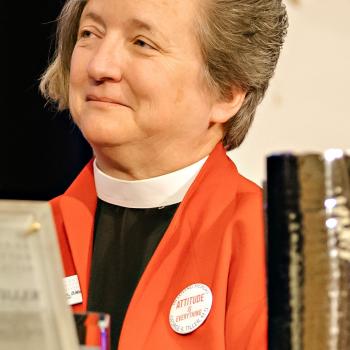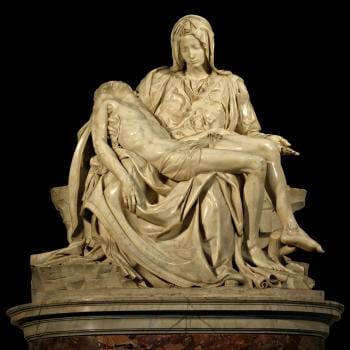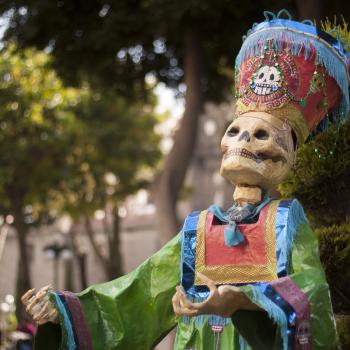I think he’s choosing his soldiers for battle.
The pope’s announcement on Sunday of fifteen new cardinals is monumental in several ways, and it indicates the way he sees the church and the world and the work that the church has to do in this new century.
Firstly, out of the fifteen choices none are from North America, five are from Europe and ten from the developing world.
Here’s the list:
Archbishop Dominique Mamberti, Prefect of the Supreme Tribunal of the Apostolic Signatura
Archbishiop Manuel José Macario do Nascimento Clemente, Patriarch of Lisbon (Portugal)
Archbishop Berhaneyesus Demerew Souraphiel, C.M., of Addis Abeba (Ethiopia)
Archbishop John Atcherley Dew of Wellington (New Zealand)
Archbishop Edoardo Menichelli of Ancona-Osimo (Italy)
Archbishop Pierre Nguyên Văn Nhon of Hà Nôi (Viêt Nam)
Archbishop Alberto Suàrez Inda of Morelia (Mexico)
Archbishop Charles Maung Bo, S.D.B., of Yangon (Myanmar)
Archbishop Francis Xavier Kriengsak Kovithavanij of Bangkok (Thailand)
Archbishop Francesco Montenegro of Agrigento (Italy)
Archbishop Daniel Fernando Sturla Berhouet, S.D.B., of Montevideo (Uruguay)
Archbishop Ricardo Blázquez Pérez of Vallodolid (Spain)
Bishop José Luis Lacunza Maestrojuán, O.A.R., of David (Panamá)
Bishop Arlindo Gomes Furtado, of Santiago de Cabo Verde (Archipelago of Cape Verde)
Bishop Soane Patita Paini Mafi of Tonga (Island of Tonga)
What is surprising is that a few of the major cities with huge Catholic populations have been passed over. As John Allen has observed, “the traditional powerhouses of Madrid, Venice, Turin, Chicago, and Los Angeles all are not led by cardinals, something virtually unheard of in modern Catholicism.”
Meanwhile out of the way Tonga, Cape Verde, Panama and Myanmar get red hats. In addition, three of the new cardinals are not Archbishops and this is another fresh approach.
What does it mean? I think it means a lot and it’s not just symbolic.
First of all, Francis is relegating some of the major Catholic players from the high table. Los Angeles and Chicago not having cardinals? That’s a big deal and it must mean that little Francis, the bus riding bishop from Argentina is making a point. It’s time for the muscle bound dioceses with deep pockets to take a rest and listen to the little guys. He’s made this choice and broken the mold because times are changing. The world is changing. The church is changing and he knows that today’s little people are tomorrow’s big people.
Not only is he choosing the “little ones” but Francis is also choosing representatives from the periphery of the church in geographical terms. New Zealand, Myanmar, Tonga, Cape Verde and Addis Ababa are out of the way and off the beaten track. Francis seems to be saying, “I came from the ends of the world. I want to some other outsiders on my team.”
His choice of cardinals also reflects the shifting demographics in the global church. Already two thirds of the world’s Catholics come from the developing world. It’s only fair that their voices are increasingly heard in the Vatican.
This shift in the Sistine Chapel’s population not only means the next pope is certainly going to be chosen from the developing world, but it changes the complexion of the church’s leadership. What we have known in the recent past is the predominance of European and North American liberals or moderates. They have been concerned with church affairs, theological questions and moral debates that have reflected the concerns of Europe and North America. The hot button issues have been women’s ordination, married priests, same sex marriage, abortion, economics and politics. Burdened by intellectual doubt, undermined by liberal Biblical scholarship, infected with modernism and weakened by establishment links, the European and North American leadership have too often presented a church that was worldly, mildly unbelieving and unconcerned about the core gospel values and the need to evangelize.
It is this kind of Catholicism that the Pope wants to engage. It is not so much that he sees the concerns of the developed church as irrelevant as he see them as secondary to more pressing matters in the battle to live the faith and proclaim the gospel.
The Cardinals from the developing world are far more likely to be concerned about basic issues like education, basic health care, economic equality and equality of opportunity. On the religious front they are far more likely to be open to charismatic worship, believe in the realities of spiritual warfare, and be courageously intent on countering the threat from Islam, evangelizing the people, encouraging vocations to the priesthood and religious life and living out the gospel in simplicity and in a dynamic and courageous way. On the question of moral and family issues they are unconcerned about women’s ordination, are heartily opposed to the homosexual agenda and reject abortion and modern reproductive technologies that violate natural law.
In other words, they will be like Francis. They will have a “preferential option for the poor” but to American neo conservatives they will probably seem alarmingly Marxist. They will believe the old, old story of a sinful humanity redeemed by God’s love through the death of his son on the cross. As such they will seem to American liberals alarmingly fundamentalist. They will be full of the joy of the Spirit, happy to inculturate the liturgy and integrate their worship style into the Mass. To American traditionalists they will seem alarmingly happy clappy. They will be engaged in spiritual warfare, believe in the reality of the devil and be unashamed of the miraculous. To American progressives they will seem alarmingly medieval.
I think the direction Francis is moving the church is fantastic. Maybe that’s because I would find my own faith to be totally at home with all the characteristics I’ve described above.
What is the pope doing? He’s putting together his battalions for battle.
The future is bright for the church and I will be excited to see how all this unfolds in the future.
Image via Bing













